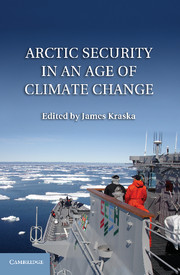Book contents
- Frontmatter
- Contents
- Figures and Tables
- Contributor Biographies
- Foreword
- Part I Introduction: Circumpolar Perspectives
- 1 Arctic Security
- 2 The Challenges and Security Issues of Arctic Marine Transport
- 3 The Arctic Meltdown and Its Implication for Ports and Shipping in Asia
- Part II European Security Interests in the Arctic
- Part III North American Security Interests in the Arctic
- Afterword
- Index
- References
1 - Arctic Security
The Indirect Approach
Published online by Cambridge University Press: 07 September 2011
- Frontmatter
- Contents
- Figures and Tables
- Contributor Biographies
- Foreword
- Part I Introduction: Circumpolar Perspectives
- 1 Arctic Security
- 2 The Challenges and Security Issues of Arctic Marine Transport
- 3 The Arctic Meltdown and Its Implication for Ports and Shipping in Asia
- Part II European Security Interests in the Arctic
- Part III North American Security Interests in the Arctic
- Afterword
- Index
- References
Summary
Invited to sum up at the end of a distinguished international conference on Arctic policy, law, and security in an era of climate change, I chose not to listen primarily for commonalities and differences in the national perspectives of the eight Arctic countries. Instead, it seemed more promising to ask, “Where do we go from here?” and to begin by considering “Where is here?” in the first place. Now, in early 2011, I write with the same questions in mind, but with the intention to elaborate. I start with impressions of the meeting and then open a discussion of tendencies in domestic and international interaction among the Arctic states. Lacking the knowledge required to consider the tendencies of all eight, I confine myself to the Canadian case, which I know best, and to Russia, which holds the future of Arctic international relations very largely in its hands. I end with thoughts on answers to the question of where next in light of recent developments, principally the appearance of the U.S. Navy's “Arctic Roadmap.”
points of departure
The conference that gave rise to this book was conducted by Commander Kraska, the volume editor, and held at the U.S. Naval War College in September, 2009. Discussions at the conference were marked by consensus on some matters, ambiguity on others, and silence on still others. As to consensus, it seemed generally to be agreed that prevailing commentary on the Arctic is too much given to drama and exaggeration when it comes to the potential for international competition and conflict. At issue here are frequent references to an Arctic meltdown, to the perfect storm that's just ahead as states clash in pursuit of resources and are ensured access to them, to the Arctic as location for the start of World War III, and so on. Prompted by certain expert analysts (purveyors of polar peril, I call them) and amplified by news editors and journalists in search of a story, the outcome is ill-judged reportage that captures public attention by overstating the likelihood of armed conflict and the need to be on guard. As I interpret the thoughts of my colleagues, there is a tacit transnational agreement among informed Arctic observers that this kind of talk is not to be trusted.
- Type
- Chapter
- Information
- Arctic Security in an Age of Climate Change , pp. 3 - 19Publisher: Cambridge University PressPrint publication year: 2011
References
- 2
- Cited by

